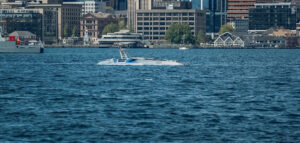
Le navire robotique sans équipage Mayflower traverse l'Atlantique avec succès

Le navire autonome Mayflower (MAS400) a terminé avec succès son voyage depuis l'Angleterre à travers l'Atlantique, atterrissant près de Plymouth Rock, Massachusetts.
Le navire robotique sans équipage, arrivé aux États-Unis le 30 juin, retraçait le voyage de 3 500 milles entre l'Angleterre et les États-Unis entrepris par les pèlerins à bord du Mayflower en 1620.
Le trimaran autonome de 15 mètres, qui n'avait aucun passager à bord, navigue grâce à l'intelligence artificielle et génère de l'énergie grâce à l'énergie solaire.
Le navire de recherche robotique a été développé par l'organisation de recherche marine ProMare avec IBM agissant en tant que principal partenaire technologique et scientifique du projet.
Le navire devait faire le voyage en septembre 2020, mais a été laissé à quai à Plymouth en raison de la pandémie. Il a fait sa première tentative de navigation en 2021 , mais des problèmes techniques ont obligé le navire à retourner à quai. Il est reparti d'Angleterre fin avril de cette année, mais a été contraint de se réacheminer vers Halifax au Canada en raison de problèmes informatiques et électriques à environ 1 600 kilomètres à l'ouest des Açores.
Le MAS400 est finalement arrivé à Halifax, en Nouvelle-Écosse, le 5 juin, après un voyage de 40 jours. Après un voyage réussi de quatre jours depuis Halifax, il est maintenant arrivé dans le port de Plymouth - le même endroit où les pèlerins sont arrivés il y a plus de 400 ans.

Le Mayflower autonome a été remorqué dans le port de Plymouth – conformément aux règles de la Garde côtière américaine pour les navires sans équipage – et amarré près d'une réplique du navire Mayflower original.
"Lorsque vous n'avez personne à bord, vous ne pouvez évidemment pas effectuer les réparations mécaniques et physiques nécessaires", explique Rob High, responsable logiciel chez IBM qui aide à travailler sur le projet. « Cela fait aussi partie du processus d'apprentissage.
"L'achèvement du voyage" signifie que nous pouvons commencer à analyser les données du voyage du navire "et approfondir les performances du système d'IA", ajoute High. Il a déclaré que la perspective de tels navires sans équipage naviguant sur les mers de manière continue facilitera la collecte de "toutes sortes de choses qui intéressent les scientifiques marins".
Sans capitaine humain ni équipage à bord, le MAS aurait été conçu comme une plate-forme appropriée pour approfondir la compréhension de problèmes critiques tels que le changement climatique, la pollution plastique des océans et la conservation des mammifères marins. En parallèle, on pense que le développement de systèmes autonomes marins transformera les industries du transport maritime, du pétrole et du gaz, des télécommunications, de la sécurité et de la défense et de la pêche et de l'aquaculture.

La réplique Mayflower à Plymouth, Massachusetts
Le navire a été propulsé par le système d'entraînement électrique et les générateurs de Fischer Panda UK .
Barry Fower, directeur général de Fischer Panda UK, affirme que le projet aura « d'énormes implications » pour l'industrie maritime.
"Nous constatons que les navires sans pilote jouent un rôle croissant dans de nombreux secteurs différents, l'intérêt pour nos systèmes pour ces applications continuant de croître", déclare Fower. "Nous sommes fiers de voir l'équipement fiable Fischer Panda à bord de Mayflower, aux côtés de certains des systèmes les plus innovants et de la technologie d'IA avancée."
Le Mayflower original était un voilier en bois qui transportait 102 passagers et a mis 10 semaines pour atteindre sa destination à l'automne 1620. En 2016, la ville de Plymouth a proposé de marquer le 400e anniversaire du voyage du Mayflower avec une réplique du navire.
